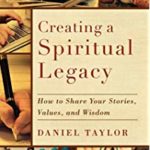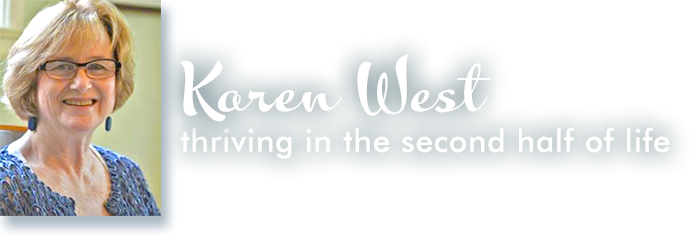I have always loved stories. As a young high school English teacher, I loved teaching literature, and I loved choosing books with stories that would lead to thoughtful discussions about life. Then about half way through my career, I began writing memoir. This experience was so powerful for me that I started having my students do it too, and they wrote some wonderful stories.
I have also always loved the opportunity to be in small groups. But I didn’t really know the incredible power of sharing our stories in small groups until I discovered conscious aging, and I started teaching an 8‑week class called “Spirituality in the Second Half of Life.” In the first week of the class, we would begin by discussing our concerns about aging. And often after someone would tell their story, someone else would thank them for sharing, because they said, they had thought they were the only one who felt that way. And now that I’m a Certified Sage-ing Leader with Sage-ing International, and I facilitate many small groups in which we share our stories, I see this happen all the time. Whenever I put my participants in dyads or in very small groups to share their stories, I always have a hard time getting them to return to the whole group. It’s easy to see how empowering those discussions are.

In The Grace in Aging: Awaken as You Grow Older, Kathleen Dowling Singh says that sharing our stories is “healing.” She says, “Healing can begin in the experience of feeling understood. It could be argued that the experience of being understood is even more nurturing than the experience of feeling loved. In the experience of being understood, we feel known and normalized, even if our story is extraordinary. Each story is an aspect of the human condition. Everyone’s story adds deeper insight into our general woundedness and into the ways we wound ourselves. We are all vulnerable behind our masks. Unless we share, we might each stay trapped in our own constructed alienation and separateness, that isolated inner cinema. Understanding from another seems to open a gate into the courage to understand ourselves.” (234)
 And not only can sharing your story be “healing” to you, but according to Daniel Taylor in Creating a Spiritual Legacy: How to Share Your Stories, Values and Wisdom, it is your “responsibility” to share your story. He writes, “Telling your stories is the central act of a spiritual legacy. It is not a self-indulgence or a passing entertainment. As part of a spiritual legacy, telling your stories is the fulfillment of a responsibility—the responsibility to pass on wisdom. It doesn’t matter whether you feel you have wisdom—your stories do.” (xi)
And not only can sharing your story be “healing” to you, but according to Daniel Taylor in Creating a Spiritual Legacy: How to Share Your Stories, Values and Wisdom, it is your “responsibility” to share your story. He writes, “Telling your stories is the central act of a spiritual legacy. It is not a self-indulgence or a passing entertainment. As part of a spiritual legacy, telling your stories is the fulfillment of a responsibility—the responsibility to pass on wisdom. It doesn’t matter whether you feel you have wisdom—your stories do.” (xi)
I think the last sentence of each of those quotes is worth repeating. “Understanding from another seems to open a gate into the courage to understand ourselves,” and “It doesn’t matter whether you feel you have wisdom—your stories do.” Often when an elder is asked to share their wisdom, they are hesitant to imagine how they can do that—one very effective way is to share their stories.
In my next blog entry, I will move on to the core topic of forgiveness, but the importance of being aware of and sharing our stories will be a theme of my blog going forward.
If you’re wondering where you can go to share your stories and to hear other people’s stories, I suggest you join Sage-ing International (go to the website “sage-ing.org” and join for free). Sage-ing International will offer you many opportunities to connect.
*Also now that you are confined to the house, it’s a great time to take our three-week online class “Online Awakening the Sage Within” (OASW). It is being offered on April 14, 21 and 28 at 1:30–4 Central time. You can register for it on the website “sage-ing.org.” Just click on “workshops.” If you have any questions about this workshop, contact me at “karenw0214@gmail.com” or 651–399-9571.
Please take care of yourselves!


4 thoughts on “Sharing Our Stories”
Karen, Your comment above “Feeling understood can be more powerful than feeling loved”, this resonates. Being kindred spirits is a beautiful experience too.
‑Dawn
Thank you, Dawn, for your comment and for mentioning “kindred spirits.” That phrase refers to such a wonderful relationship.
I’m so glad you highlighted the importance of being understood. We all long for others to “get” what’s important to us, to understand us. I see that all the time in the personal story writing classes I teach with older people. Sharing stories and being understood is what helps us build a sense of community — to belong.
Thank you for your comment, Pat. I would love to hear more about the writing classes you teach.